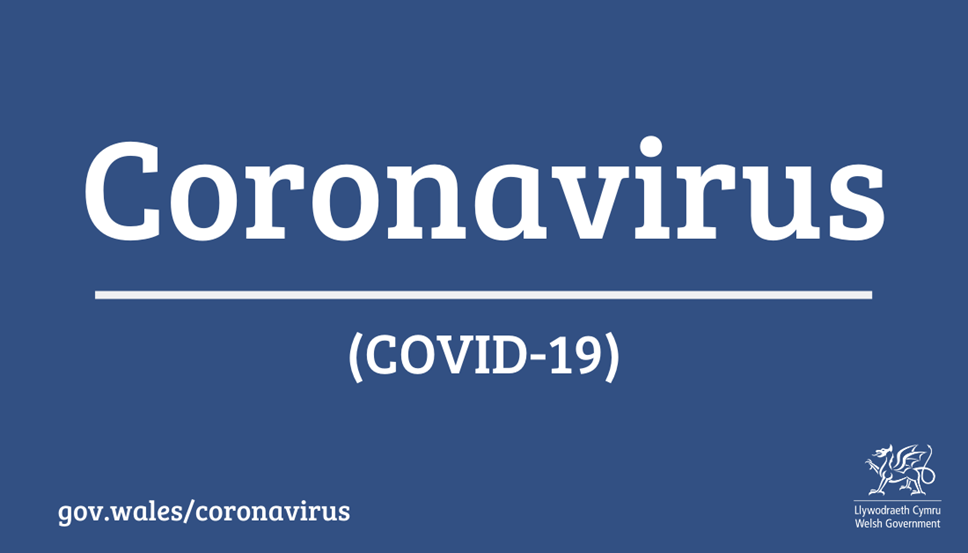
Statement by Chief Medical Officer for Wales, Dr Frank Atherton - Coronavirus: Face Coverings
Datganiad gan Dr Frank Atherton, Prif Swyddog Meddygol Cymru - Coronafeirws: Gorchuddion Wyneb
There has been a lot of discussion about the role of face coverings and personal protective equipment (PPE) for the public in preventing the spread of Covid-19.
Evidence has been presented at the UK’s Scientific Advisory Group for Emergencies (SAGE); I’ve discussed it with the other UK Chief Medical Officers and we’ve looked carefully at the World Health Organisation advice and what’s happening in other countries.
I am not recommending the compulsory wearing of face coverings by everyone whenever they leave home – this should be a matter of personal choice.
This is a complicated issue and I want to explain the advantages and disadvantages to help you decide.
There are differences between the clinical-grade PPE worn by health and social care staff and other forms of protection available for the general public.
The PPE worn in a clinical or care setting, to protect an individual and their caregiver, must be made to certain standards, which are set by the Medical and Healthcare Products Regulatory Agency (MHRA) and must be worn according to strict guidelines.
Coronavirus has put pressure on supplies of PPE worldwide and we need to ensure we have enough PPE to protect health and social care workers and people who are ill.
So what do we know about the use of non-clinical face coverings for the general public? The evidence from SAGE shows a small, but marginally positive effect on reducing the risk of a coronavirus infection in others.
We know that you could be infectious even if you don’t have symptoms – so could people around you. When someone with the virus coughs or breathes, the infection travels through the air in droplets and lands on surfaces. If you’re wearing a cloth face covering over your mouth and nose some of the droplets will be stopped by that mask.
There is also evidence that infection can be transmitted when you touch your nose or mouth and then touch a surface. We touch our faces a lot throughout the day – a face covering or mask could help you stop doing that.
We think the greatest risk of infection occurs indoors. If you are travelling on public transport, you may not be able to maintain the 2m social distancing for the whole journey – in these circumstances, a face covering might be useful.
But, I have concerns about three harms, which could come about if I recommended face coverings for public use in Wales.
The first is in relation to stocks of clinical masks for frontline caregivers. We don’t know if there will be enough masks in the UK, let alone in Wales, if the public and employers are trying to buy clinical grade masks at the same time as the NHS.
There may be a small benefit to public health if everyone wears a face covering, but we know there is a much bigger, proven benefit to public health if all our health and social care staff wear clinical grade masks when caring for people.
The second harm is from an increase in risky behaviours. Anyone with symptoms of a respiratory infection should be staying at home and it would not be acceptable for them to use a face covering in order to go shopping or to work.
Wearing a face covering won’t protect you from others – it will protect others from you and then only if you don’t potentially transfer the virus in other ways. You will also need to maintain social distancing, keep washing your hands regularly in hot water and with soap and follow the other safety guidelines as well.
The final harm is discrimination. Not everyone can buy a mask or make one. But you can stay safe by socially distancing, by keeping your hands clean and not touching your face, without a mask.
As Chief Medical Officer for Wales, I am not recommending everyone wears a non-clinical face covering in Wales – I am not recommending they are compulsory. However, I support the public’s right to choose whether to wear them.
Our advice remains to stay at home, to protect the NHS and save lives.
If you are leaving your home to work, shop or exercise, you should take all possible measures to stay safe and protect yourself, including maintaining social distancing, washing your hands regularly and not touching your face.
